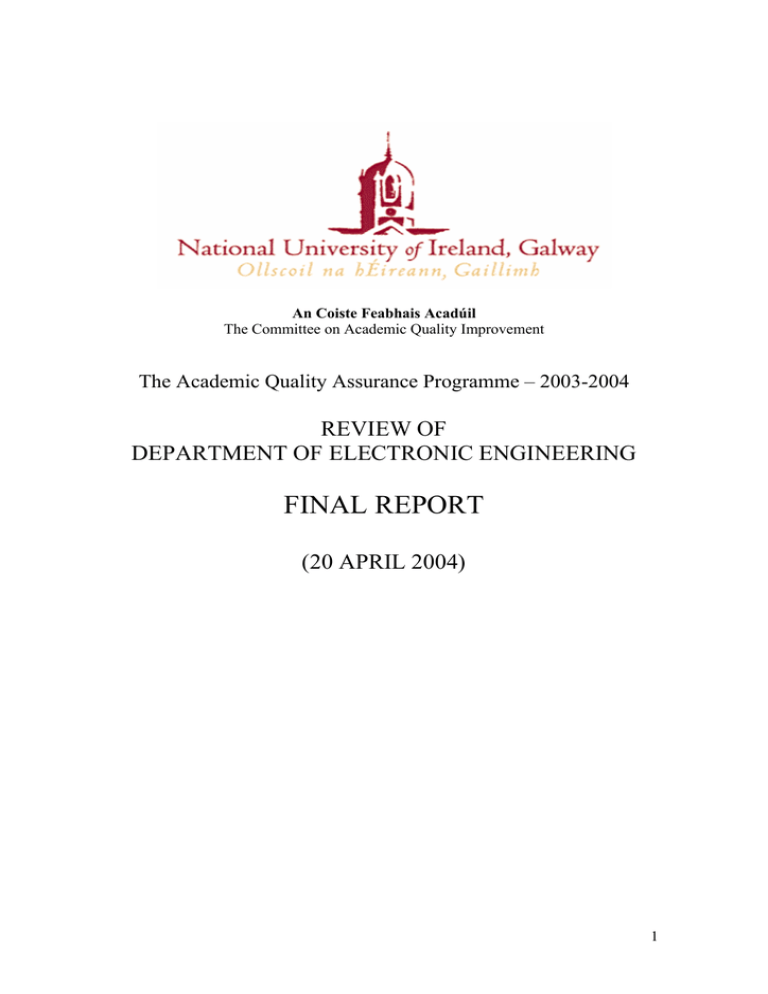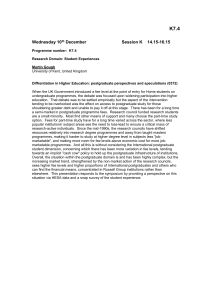FINAL REPORT REVIEW OF DEPARTMENT OF ELECTRONIC ENGINEERING
advertisement

An Coiste Feabhais Acadúil The Committee on Academic Quality Improvement The Academic Quality Assurance Programme – 2003-2004 REVIEW OF DEPARTMENT OF ELECTRONIC ENGINEERING FINAL REPORT (20 APRIL 2004) 1 This report arises from a visit by a review team to the Department of Electronic Engineering on 4-6th February, 2004. The Department had already prepared and submitted a 'Self Assessment Report' that, with other documentation, was made available to the review team well in advance of the visit. The current review is a followup review, as the Department was previously reviewed in 1998. The review team consisted of: Professor Peter Cheung, Department of Electrical and Electronic Engineering, Imperial College, London (Chairman); Professor Frank Boland, Department of Electronic and Electrical Engineering, Trinity College, Dublin; Mr Tom O'Dwyer, Engineering Manager, Analog Devices, Limerick; Dr Piaras Ó hEachteirn, Department of Civil Engineering, NUI, Galway and Ms Marie McGonagle, Law Faculty, NUI, Galway, acting as Rapporteur. Mr Ian McKenna, Assistant Principal Officer, Department of Education and Science, Dublin was in attendance as an observer. The report is structured to cover the following main topics: Introduction 1. Aims and Objectives 2. Organization and Management 3. Programmes and Instruction 4. Scholarship and Research 5. The Wider Context 6. Recommendations 7. Summary and Concluding Remarks 2 INTRODUCTION The Department of Electronic Engineering, which is situated at Nuns Island, has 13 fulltime staff members, including three senior technicians and a secretarial/clerical assistant. The Department offers a B.E. degree in Electronic Engineering, introduced in 1979 and a B.E. degree in Electronic and Computer Engineering, introduced in 1997. At post-graduate level the Department offers a Master of Engineering Science by research, a Master of Applied Science and a Ph.D. programme. 1. AIMS AND OBJECTIVES The primary aims and objectives of the Department, as set out in the self-assessment document, include the provision of up-to-date undergraduate degree programmes, a good standard of service to undergraduate and postgraduate students and engagement in research of national and international importance. The Review team believes that the stated aims and objectives are appropriate and in line with the University's strategic plan. The Review team commends the Department on its commitment and effort to meet its objectives, as considered below. The team was pleased to see the Department's operational and development plans, research handbook and other policy documents. All of the documentation submitted by the Department to the Review team was well put together, clear and coherent. 2. ORGANISATION AND MANAGEMENT The Department is well managed and organised. The assignment of specific administrative duties leads to a smoothly running and efficient department. The high esprit de corps among all members of staff - academic, technical and administrative, referred to in the 1998 review report, is still clearly evident. 2.1 Delegation of administrative duties There is a general perception by the more junior members of staff that they are asked to take on a significantly higher administrative workload than others. While they have carried out such administrative duties so far with efficiency and dedication, they felt that their efforts in this aspect of their job often went unnoticed or unrewarded. The departmental administrative duties are presented in Appendix F of the Self-assessment Report in the format of a table. The Review team feels that the use of ticks in this table might be replaced by some more quantitative measure (such as estimated hours per annum). This might lead to a better distributed and more transparent administrative workload, especially vis-à-vis the more junior members of staff. 2.2 Staff profile The departmental academic staff profile is highly skewed towards younger staff at the lower grades because of historical university recruitment policies. This situation is less than optimal for any department and steps should be taken to correct it. Perhaps the university could help promotion to the higher grades through some extra university development resources specifically directed to addressing this problem. 3 2.3 Sabbatical leave The policy and practice regarding sabbatical leave is especially important for this department. Many staff members are young and are graduates only of this department. Consequently they would benefit greatly from exposure to the practices, procedures, culture, etc. of another university, as well as gaining valuable research opportunities and contacts. The Department should encourage and facilitate staff members to avail of sabbatical leave. Perhaps the university could provide some special enabling grants or support specifically to deal with this issue. Perhaps reciprocal sabbaticals with another university might be possible. Such arrangements could in addition be used to improve the experience base of the Department, albeit temporarily. 2.4 Training Junior and new staff in particular would benefit from additional training, particularly with regard to roles and responsibilities, as well as teaching techniques. Mandatory induction courses for new staff should be introduced and inexperienced staff members should be encouraged to participate in the CELT initiative. 2.5 Student Numbers The falling number of second level students choosing Electronic Engineering is a concern for the Department, and the Review Group commends the actions it has taken to address this, as outlined in Appendix A (3.1) of the Self-Assessment Report. This fall in numbers will have a detrimental effect on the ability of this young department to expand its size and staff. This fall in numbers is also a serious concern to industry and to government. In addition to the actions already underway, such as the University Open Day, Steps, Midas, the recruitment of non-EU nationals and IT alumni, the group recommends strong marketing of the course to the common engineering entry course. In particular, students (and prospective students) should be made aware of the Third Report of the Expert Group on Future Skills Needs, a Forfás publication summarising the judged future demand for different skills in the economy. This shows a significant shortfall expected in the Information Technology field in general and particularly in specialised areas such as IC Design. If students were made fully aware of the medium-term employment prospects as opposed to the situation at present, they would be more likely to consider it as a career. The group also noted the strong gender imbalance, which still exists in the classes. The typical female population is 10-20%. In some other EU countries, such as Spain, the split is typically 30-40%. This may offer an opportunity to expand student numbers by increased focus on the potential of female intake. The Department could consider expanding its promotional activities to include all-female schools. Likewise, non-EU students would provide much needed diversity and finance, which could help the Department in the solution of a variety of problems. Recent visits to Malaysia by Faculty members could be extended elsewhere (for example, China). 4 2.6 Succession In view of the anticipated retirement of the current Head of Department in a few years time, and the preponderance of young academic staff at the lower grades, it is essential that forward planning be undertaken and a specific succession plan formulated soon. 2.7 Strategic departmental meetings An annual off-campus meeting involving all the academic staff of the Department should be held to give focused direction to the Department. Such meetings avoid dayto-day departmental administrative distractions and allow staff to plan strategic initiatives. Also the progress of the previous year can be reviewed, especially in the research area (see further below). Younger staff members in particular would benefit through greater preparatory planning and acquiring a sense of ownership of departmental strategy. 2.8 Safety While the Department has a safety statement and awareness, the Department should try to achieve best practice with the active participation of the university Buildings Office. Despite repeated requests by the Department, a safety audit of buildings, etc., by a qualified person has not been carried out. It is strongly recommended that this safety audit take place, even if escalation to higher authority is required to ensure it takes place. 2.9 Co-operation and interaction with the Information Technology Department The current six-weekly and staff-student liaison committee meetings are good but possible conflicts of interest and poor communications issues need to be addressed. 2.10 Technicians The Department's dedicated technicians are one of its obvious strengths. Feedback from students and researchers was very positive. Individual technicians' contributions need to be evaluated and, if found to be significantly above and beyond standard performance, should be recognised and rewarded by promotion to a higher grade. An extra higher grade may need to be created by the university to facilitate this, but it is important to reward excellence, especially where such excellence significantly reduces the workload of more senior academics. 3. PROGRAMMES AND INSTRUCTION The Department is to be complimented on the success of the implementation of the new programme in Electronic & Computer Engineering. Its timely introduction has eased the impact of the nationwide reduction in the numbers of applicants to Electronic Engineering and Information Technology courses. Both the Electronic Engineering (EE) and Electronic & Computer Engineering (ECE) have experienced this reduction in demand but the Review team was pleased to note that the median quality of the students entering the programmes remains at a good level. The Review team established through interviews conducted with a cross section of students and was pleased to learn of the total satisfaction among these students of the teaching and support offered by the Department. It was particularly impressive to find that on three separate occasions mild 5 criticisms or suggestions by students from senior years have already been rectified. It demonstrates the Department’s responsiveness to students’ concerns and its willingness to improve. 3.1 Contact hours Both the EE and the ECE courses have contact hours that are on the upper end of subject norms. Although the Department has a strong teaching record and there were no complaints about excessive teaching workload, the Department could explore a managed reduction in contact hours with a view to increasing the opportunity for staff (i) to participate in research and postgraduate education and (ii) to engage in the supervision of undergraduate project work. The latter role could be associated with the introduction of a 'research internship' scheme as an alternative to a work placement (Professional Engineering Programme - PEP), although the group recommends that the PEP remain the first choice and that the Department continue to strive hard to place students in industry. 3.2 Tutorials The Department has been responsive to the recommendations of the previous Review in its introduction of a tutorial component to its taught courses. These take the form of 'problem solving' classes involving the entire class. If the Department is successful in increasing the number of their post-graduate students in the future, the extra teaching support available may be deployed to improve the tutorial sessions by reducing the class size. 3.3 Quality Assurance questionnaires Currently the solicitation of Quality Assurance questionnaires from students is optional and depends on the initiatives of individual lecturers. To ensure continued improvement of the Department’s already excellent teaching, the Review team recommends that the Department should make Quality Assurance questionnaire responses from students on each course formal and compulsory. 3.4 Projects The Department has been progressive in introducing more project-based teaching into their programmes. This reflects the fine responsiveness of the Department to both the concerns of students and broader academic and professional developments. The project work of Final Year students is recognised by the Department to be a vital part of the degree programmes. Students were very appreciative of the excellent accessibility and advice of academic and technical staff of the Department to support their project and laboratory work. However, there were concerns among students that they were not able to choose the subject of interest for their projects. In the absence of subject electives, the Review team feels strongly that it is particularly important for students to influence the choice of their individual project. The Department should provide the opportunity for students to express their preference in working in a specific subject area. This would also provide the students with an opportunity to give some individual direction to their studies. 3.5 External Examiner’s Reports The Review team was surprised that only two examiners' reports were available. It was then established that the problem may lie with central administration and not with the 6 Department. In order to protect the Department from possible problems with future accreditation visits, it is strongly recommended that the University review its procedure on handling external examiners' reports. For example, more effort could be directed towards chasing missing external examiners' reports and the Department should not only be informed of such reports, but required to provide responses to suggestions and criticisms. 4. SCHOLARSHIP AND RESEARCH The research output of the Department is commendable given its size and resources. The Department has a good international reputation in some areas, most notably Magnetics. The research funding attracted by the Department has been consistently good and was increased significantly in 2003. However the distribution of funding among staff members is uneven. 4.1 Research focus The Department has made an initial effort to align its research effort towards the Faculty and University strategic plan in targeting its research in specific areas. However, the Department’s aspiration and its Research Plan could be significantly more ambitious given its potentials and talents. It is recommended that the Department have a one-day retreat to develop a more ambitious research plan focussing in one or two strategic areas, particularly in Biomedical Engineering. Through this, it is hoped that the entire staff would share a common vision and work more as a team than a collection of individuals. A further suggestion is to target a researcher with an international research profile sufficient to attract SFI funding under the Fellow or Investigator Award programmes. This will have the advantage of adding a fresh perspective to the Department as well as enhancing its reputation and ability to attract further funding. The Department is in a particularly advantageous position with regard to recruitment of middle-level research managers, due to the recent closure of a number of research- and development-intensive electronics companies in the local area. The staff of these companies would have included first-class honours graduates with experience in supervision of researchers, who would have little difficulty in making the transition to academic research. We recommend that the Department target these people to build its research infrastructure, particularly if SFI funding is forthcoming. 4.2 Research space The plans of the Department to expand research are currently hampered by the lack of space. This problem has reached crisis point. While it may be rectified in the medium term by the proposed new Engineering Building, an immediate solution must be found. Specifically, if the objective of increasing research postgraduates is to be realised, the Review team recommend that increased space should be made available to this Department. The Review team also has concerns over the health and safety aspects of some of the laboratories they inspected, particularly those which contained soldering stations. Since decisions on the allocation of buildings and office space are vested in the office of the President at NUI, Galway, we recommend that the urgency of the matter be brought to his attention. 7 4.3 Development of junior staff in research In general, the junior staff are enthusiastic towards research and are making a strong effort to improve their profile and output. However there is evidence that they need stronger support from senior staff to advise and assist with their research development. It is recognised that due to the small number of professorial staff, providing such support may not be easy. The successful procurement of a SFI funded Investigator mentioned in section 4.1 would be beneficial. 4.4 Supervision and structure of postgraduate students There is strong rapport between postgraduate students and staff. Most students thought that their access to staff members was good. However, it was suggested that a more formal structure in the postgraduate programme be implemented. Specifically, clear research objectives, schedule, milestones and deadlines should be established. These should be reviewed formally by academic staff on a regular basis. This would improve the completion time of postgraduate students, which is currently much longer than the normal period. 4.5 Research publications The recent improvement in the Department’s conference publications is noted. However, this is not matched by a corresponding increase in refereed journal articles. The Department should establish clear targets in this area. It should encourage staff to extend their conference publications into journal articles if appropriate. 5. THE WIDER CONTEXT 5.1 Budgets Budgets should be devolved to departments in a significant way - sizeable meaningful budgets, not tiny insignificant budgets. Carry-over from year to year should be allowed to enable a more consistent spending pattern. 5.2 Promoting awareness The Review team noted above the involvement of the members of the Department in initiatives such as STEPS and MIDAS. It is vital that this pattern continue, not only to raise the profile and status of the Department of Electronic Engineering in the wider community, but also to promote employment opportunities amongst potential students, particularly at this time of reduced industrial activity in immediate environs of NUI, Galway. 5.3 Relationship with GMIT The Review team also noted the very positive disposition of the academic staff towards diploma graduates from neighbouring Galway Mayo Institute of Technology. These students bring very substantial laboratory and practical experience to the learning environment in the Department. This relationship should continue to be promoted. 5.4 Status in the wider community In conclusion, it is clear that this Department has a strong reputation within the broader education system, and the disposition of its students help underpin the status of NUI, Galway in the wider community. 8 6. RECOMMENDATIONS 6.1 Recommendations to the Department • • • • • • • • • • The equality and transparency in the distribution of administrative load should be improved. This may be achieved by adopting a more quantitative measure (such as estimated hours per annum) in the load allocation. The Department should encourage and facilitate staff members to avail of sabbatical leave. There should be a stronger drive towards marketing the course to the common engineering entry course and recruiting other categories of students (more female, EU, etc.). The Department could explore the introduction of a 'research internship' scheme as an alternative to work placement. The Department should have formal Quality Assurance questionnaire responses from students on each course. The Department should provide the opportunity for students to express an interest in working in a specific subject area for their final year project. The Department should organise a one-day retreat to develop a more ambitious research plan focussing in one or two strategic areas, particularly in Biomedical Engineering. The Department should target a researcher with an international research profile sufficient to attract SFI funding under the Fellow or Investigator award programmes. The Department should target middle-level research managers, who may be available due to the recent closure of a number of research- and development-intensive electronics companies in the local area, to build its research infrastructure, particularly if SFI funding is forthcoming. A formal structure in the postgraduate programme should be implemented. The Department should establish clear targets for research and encourage staff to extend their conference publications into journal articles if appropriate. 6.2 Recommendations to the University • • • • • • As the academic staff of the Department are predominantly at the lower grades, the university could help promotion to the higher grades through the allocation of some extra university development resources. The University could provide some special enabling grants or support specifically to enable younger staff to avail of sabbatical leave. Mandatory induction courses for new staff should be introduced. The University should formulate with the Department a specific succession plan ahead of known retirement. An externally conducted safety audit of the Department is strongly recommended. Individual technicians' contributions need to be evaluated and, if found to be significantly above and beyond standard performance, should be recognised and rewarded by promotion to a higher grade. 9 • • • The plans of the Department to expand research are current hampered by the lack of space. This problem has reached crisis point and an immediate solution must be found. Significant budgets should be devolved to departments. The University should review its procedures for securing, handling and responding to external examiners' reports. 7. Summary Staff The Department of Electronic Engineering is well managed and organised and there is a strong esprit de corps among all members of staff. There is a high number of junior staff in the Department, however, which calls for particular attention. They must be facilitated through sabbatical leave, training and other assistance to develop their teaching and research and to become well positioned for promotion to the higher grades. There is a general perception among the more junior staff that they are asked to take on a significantly higher administrative workload than others. It is essential that forward planning be undertaken. The Department's dedicated technicians are one of its obvious strengths. Feedback from students and researchers was very positive. Teaching programmes Both the Electronic Engineering (EE) and Electronic & Computer Engineering (ECE) have experienced a reduction in demand but the Review team was pleased to note that the median quality of the students entering the programmes remains at a good level and that students expressed total satisfaction with the teaching and support offered by the Department. The Department has been responsive to the recommendations of the previous Review in its introduction of a tutorial component to its taught courses. It has also been progressive in introducing more project-based teaching into its programmes but it is important that students be able to influence the choice of their individual project. There is strong rapport between postgraduate students and staff but a more formal structure in the postgraduate programme needs to be implemented. Research The Department has made an initial effort to align its research effort towards the Faculty and University strategic plan but its aspiration and Research Plan could be significantly more ambitious. It is recommended that the Department have a one-day retreat to develop a more ambitious research plan and that it target a researcher with an international research profile sufficient to attract SFI funding under the Fellow or Investigator Award programmes, as well as middle-level research managers, who may be available in the area due to the recent closure of a number of local research- and development-intensive electronics companies. Staff should be encouraged to extend their conference publications into journal articles if appropriate. 10 Awareness The falling number of second level students choosing Electronic Engineering is a concern for the Department, and the Review Group commends the actions it has taken to address this. In this regard, a stronger drive should be taken towards marketing the course to the common engineering entry course and recruiting other categories of students (more female, EU, etc.). Space Research space is urgently required especially if the objective of increasing research postgraduates is to be realised. Safety It is strongly recommended that an external safety audit take place. Professor Peter Cheung (Chair) Professor Frank Boland Mr Tom O'Dwyer Mr Ian McKenna Dr Piaras Ó hEachteirn Ms Marie McGonagle (Rapporteur) (20 April 2004). 11 Comments on the Methodology of the Review Process 1. The Review team felt that, while two full days appeared long, it gave the opportunity for a deeper understanding of the programmes, structures and operation of the Department and consequently a thorough and coherent review. The composition of the review team was an important factor as it was useful and beneficial, for example, to have a member of the team from outside the jurisdiction. 2. The team enjoyed the full co-operation of the Department both by way of documentation supplied and assistance given during the visit. The team felt, on reflection, that some further documentation, such as the report of the accreditation body and copies of student questionnaires, might have been helpful. 3. The team felt that it might have been helpful also to meet with the heads of related departments that share in the delivery of programmes with the Department of Electronic Engineering. Better planning and organisation of the visit to related university facilities would have assisted the team. 12






